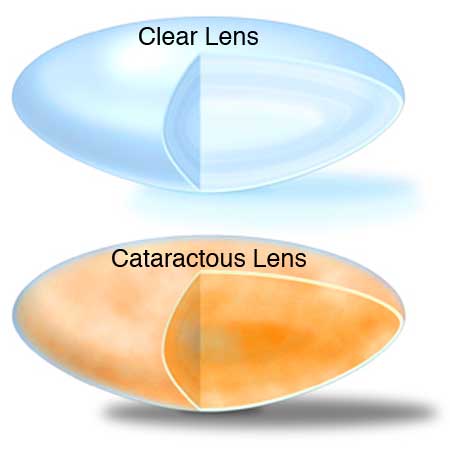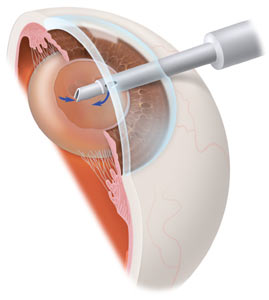Cataract Treatment at Remke Eye Clinic


Cataract occurs as ultraviolet light entering the eye interacts with the proteins in the natural lens within your eye. The clear natural lens becomes cloudy as time goes by. Although this process begins when we are young, it becomes noticeable to your eye doctor normally in your 50’s and 60’s. When the clouding becomes bad enough to cut down or your visual acuity during an eye examination, it is diagnosed as “cataract.” The exact age of onset, rate of progression and severity of cataracts varies from one person to the next. While most cataracts simply come with age, there are a number of risk factors: smoking, diabetes, retinal surgery, family history, steroids and certain other drugs, trauma, and ocular inflammation.
Symptoms of Cataracts
Cataracts cause symptoms including blurry vision near and/or far, sensitivity to glare, and an imperceptible but progressive loss of color vision as the lens turns yellow. Generally it is when either the clarity of vision is not good, or when glare sensitivity on bright days or at night that a person seeks help for the cataract. Whenever you have difficulty with your vision, from any cause, you should come in and let us evaluate the situation and diagnose the problem.
How are Cataracts diagnosed?
Cataract is diagnosed in the course of a comprehensive eye examination, or call for an appointment at Remke Eye Clinic. The doctors at Remke Eye Clinic provide pre-operative consultations, second opinions and post-operative care. We often receive referrals from other doctors, but welcome self-referrals as well.
How are Cataracts treated?
Once your vision with corrective glasses or contact lenses is no longer adequate for you to comfortably, safely do your normal activities, it is time to consider cataract surgery. The only effective treatment for cataract is cataract surgery. This is a common procedure. At Remke Eye Clinic, we do hundreds of cataract surgeries a year. The surgery involves a relaxing sedative and “topical” anesthesia for complete comfort. Under microscopic control, the surgeon removes the cloudy lens and replaces it with a new, clear artificial lens.


The surgery itself generally takes less than 15 minutes in most cases. The patient goes home about 2 hours after arrival at the surgery center. The vision may be blurry for the first few days, but gradually gets better. Typical post-operative care includes eye drops for approximately 4 weeks, and most are ready for glasses 3 to 4 weeks after surgery. Occasionally the post-operative care involves higher levels of medication and visits, but most people are ready for new glasses about 2 weeks post surgery. The doctors use the most current proven methods in their cataract surgery. The doctors provide pre-operative consultations, second opinions and post-operative care.
Glasses After Cataract Surgery
While there are exceptions you will likely need to wear glasses after the cataract extraction procedure at least some of the time. For example, everyone should wear sunglasses. Depending on the patient and the type of implant, glasses can be helpful for either distance or reading vision or both in order to get the best possible vision. Some patients either do not mind or prefer to wear glasses, so for them the monofocal implant provides excellent results. If there are circumstances when you really do not want to wear glasses, however, there are methods to try to help you by carefully choosing the monofocal implant. You have more options now than ever before!
If you would like to reduce your dependency on Glasses
Patients receiving the Premium Lens Implants generally are much less dependent on glasses than those electing for the Monofocal Implant. The degree of need and the circumstances when glasses will be helpful depend on your eyes, your lens implant, your activities and your expressed preferences. You should carefully discuss with your doctor any questions you have about how your vision will be with and without glasses. You and your doctor make a plan together to best fit your needs. More information on glasses need and refractive issues is available.There are options!
Do Cataracts come back?
About 15-20% of patients having successful cataract surgery will later develop “Secondary Cataract.” This may occur weeks, months or more commonly years, later, even after perfectly performed surgery. This requires an office laser treatment to correct. The treatment is quick, painless and highly effective. Very infrequently, a torn or detached retina may follow this kind of treatment. Also very occasionally patients may develop glaucoma afterward. Again, these problems don’t arise very often, and untreated secondary cataract causes progressive vision loss until it is treated with the laser.
Risks of Cataract Surgery
INTRODUCTION
Please read this information carefully and completely. If you have any questions, ask your eye doctor. Your decision should be based on your own visual needs following a thorough consultation with your eye doctor. The purpose of the following information is to give you a general introduction to the potential problems and potential benefits of cataract surgery. Any decision regarding surgery should be made by you in consultation with your doctor.
POTENTIAL BENEFITS OF CATARACT SURGERY
Although the results of your surgery cannot be guaranteed, the expected benefit of cataract extraction is to improve vision to the extent allowed by removal of a cloudy lens. Cataract extraction is intended to remove a cloudy lens that is reducing your vision. Usually, an artificial lens is placed after removal of the cataract. The cataract procedure will not improve the condition of the cornea, retina or optic nerve and if these structures are responsible for decreased vision, the cataract extraction process will not improve those problems. The surgery is intended only to improve the optical clarity of the eye hopefully resulting in a useful improvement in vision. Specific results from this treatment cannot be guaranteed.
GLASSES AFTER SURGERY
You will need to wear glasses at least some of the time after the cataract extraction procedure for either distance or reading vision or both in order to get the best possible vision. You should carefully discuss with your doctor any questions you have about how your vision will be with and without glasses. You and your doctor make a plan together to best fit your needs. More information on refractive issues is available.
DISCOMFORT
Discomfort during surgery is unusual, and if it occurs additional pain relief medication is administered. After the surgery, irritation and minor aching is usually relieved by Tylenol or similar medication. If that is insufficient, call the doctor to discuss what should be done. Painful complications such as infection, high pressure, need for secondary surgeries or corneal abrasion occur infrequently.
COMMON RISKS
Any surgical procedure carries potential risks. Cataract extraction may be followed by complications. Risks of cataract extraction include, but are not limited to, infection, bleeding, retinal detachment, dislocation of the cataract or lens implant, corneal clouding or scarring, macular swelling (edema), worsening of diabetic retinopathy or macular degeneration, glaucoma (high pressure), inflammation, reduced or complete loss of vision or eye, corneal abrasion, astigmatism, need for laser after cataract extraction, need for additional surgical procedures, bruising from injection, irregular pupil, iris prolapse, drooping of eyelid, glare or reflections from lens implant, and need for glasses after surgery. Complications due to anesthetic injection or sedation are possible, due to drug reactions or other problems. These complications may involve other parts of your body, including the possibility of brain damage or even death. Rarely, the optic nerve may be damaged which can result in loss of sight. There is a possibility of hemorrhage or bleeding. In some cases, complications may occur weeks, months or even years later. Some complications could result in the need for more surgical procedures. One situation that is fairly common is for a “secondary cataract” to form, sometimes months but usually years after even perfectly performed surgery. This requires a laser treatment to correct. Since it is not possible to list every potential complication that may occur as a result of any surgery, this list may be incomplete and there may be risks associated with laser surgery that are currently unknown. Contact your doctor with any problems noticed after the surgery, such as pain, light sensitivity, loss of vision, or unusual mattering or discharge from the operative eye. Many complications are manageable if caught early. You are responsible for reporting any symptoms and making arrangements to be evaluated.
ALTERNATIVE TREATMENTS
You may elect not to have cataract extraction, or to postpone it. In this situation, it is expected your condition will stay the same, or worsen over time. Presently, there is no other known therapy for reduced vision from a cloudy cataract other than surgical removal. You will confer with your doctor as to the lens implant style and power options for your needs.



